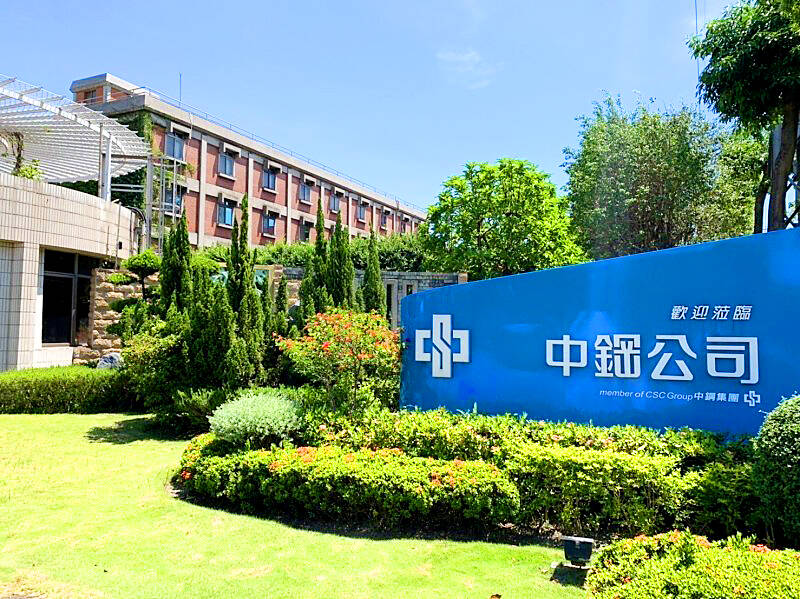China Steel Corp (中鋼), the nation’s largest steelmaker, yesterday raised major steel product prices by NT$300 (US$9.71) per tonne for domestic deliveries next month, thanks to improving domestic demand from makers of vehicles, as well as computers and servers due to growing artificial intelligence (AI) applications.
Domestic steel consumption is poised to recover from the trough as inventory correction is nearing an end, the Kaohsiung-based steelmaker said in a statement.
The market outlook is positive, aided by the government’s NT$680 billion public infrastructure project, giving a further lift to steel demand, the company said.

Photo courtesy of China Steel Corp
“Market confidence is recovering. Inventory rebuild demand is poised to emerge,” China Steel said. “As the steel market is in the nascent stage of a recovery, the company is raising steel prices moderately to reflect increases in raw material costs and foreign exchange rate fluctuations.”
The global prices of coking coal and iron ore have hit the bottom and are poised for a rebound, China Steel said.
The price of iron ore has lingered at the bottom at about US$105 to US$115 per tonne, while the price of coking coal has recovered to between US$225 and US$235 per tonne, China Steel said.
Snapping two straight months of price reductions, China Steel raised the prices of hot-rolled steel plates, hot-rolled steel coils and cold-rolled steel plates by NT$300 per tonne.
It also increased the price of galvannealed steel coils used in construction by NT$300 per tonne, but kept the price unchanged for galvannealed steel coils used in home appliances and computers, as well as the price of electrical steel coils.
China Steel’s price hikes matched upward adjustments by its Chinese counterparts. Baowu Steel Group Ltd (寶武鋼鐵), the world’s biggest steelmaker, and Angang Steel Co (鞍山鋼鐵) raised the prices for hot-rolled, cold-rolled and galvannealed steel by 100 yuan (US$14) per tonne for deliveries next month, in a sign that global steel prices would go up further in the second half of this year, China Steel said in the statement.
That was the first price hike in four months by Baowu Steel and Angang Steel.
China Steel’s pretax profit in the first five months of the year plunged 93 percent to NT$1.72 billion from NT$24.6 billion during the same period last year, its filing with the Taiwan Stock Exchange on June 26 showed.
The company attributed the decline to falling steel shipments, lower prices and gross margin erosion.

When an apartment comes up for rent in Germany’s big cities, hundreds of prospective tenants often queue down the street to view it, but the acute shortage of affordable housing is getting scant attention ahead of today’s snap general election. “Housing is one of the main problems for people, but nobody talks about it, nobody takes it seriously,” said Andreas Ibel, president of Build Europe, an association representing housing developers. Migration and the sluggish economy top the list of voters’ concerns, but analysts say housing policy fails to break through as returns on investment take time to register, making the

‘SILVER LINING’: Although the news caused TSMC to fall on the local market, an analyst said that as tariffs are not set to go into effect until April, there is still time for negotiations US President Donald Trump on Tuesday said that he would likely impose tariffs on semiconductor, automobile and pharmaceutical imports of about 25 percent, with an announcement coming as soon as April 2 in a move that would represent a dramatic widening of the US leader’s trade war. “I probably will tell you that on April 2, but it’ll be in the neighborhood of 25 percent,” Trump told reporters at his Mar-a-Lago club when asked about his plan for auto tariffs. Asked about similar levies on pharmaceutical drugs and semiconductors, the president said that “it’ll be 25 percent and higher, and it’ll

CHIP BOOM: Revenue for the semiconductor industry is set to reach US$1 trillion by 2032, opening up opportunities for the chip pacakging and testing company, it said ASE Technology Holding Co (日月光投控), the world’s largest provider of outsourced semiconductor assembly and test (OSAT) services, yesterday launched a new advanced manufacturing facility in Penang, Malaysia, aiming to meet growing demand for emerging technologies such as generative artificial intelligence (AI) applications. The US$300 million facility is a critical step in expanding ASE’s global footprint, offering an alternative for customers from the US, Europe, Japan, South Korea and China to assemble and test chips outside of Taiwan amid efforts to diversify supply chains. The plant, the company’s fifth in Malaysia, is part of a strategic expansion plan that would more than triple

Taiwanese artificial intelligence (AI) server makers are expected to make major investments in Texas in May after US President Donald Trump’s first 100 days in office and amid his rising tariff threats, Taiwan Electrical and Electronic Manufacturers’ Association (TEEMA, 台灣電子電機公會) chairman Richard Lee (李詩欽) said yesterday. The association led a delegation of seven AI server manufacturers to Washington, as well as the US states of California, Texas and New Mexico, to discuss land and tax issues, as Taiwanese firms speed up their production plans in the US with many of them seeing Texas as their top option for investment, Lee said. The